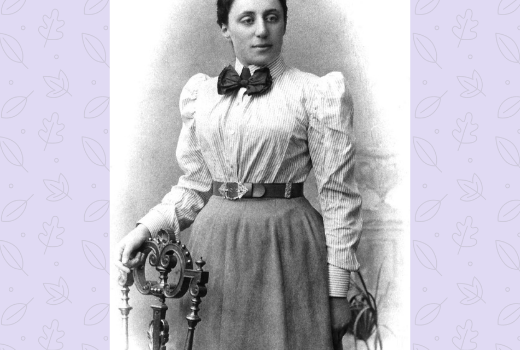(Text by Erik Menzel)
Emmy Noether, in full Amalie Emmy Noether (March 23, 1882, Erlangen, Germany-April 14, 1935, Bryn Mawr, Pennsylvania, U.S.), was born to the Jewish family of Max Noether and Ida Amalia Noether and was the sister of 4 brothers of which 3 died untimely.
In school she didn’t stand out, but was noted to be clever and friendly. Like all girls of her time, she was taught the skills to run a household. Her focus in school was on languages and she passed the exam to teach French and English to women.
She started her studies of mathematics at the university of Göttingen at a time when women were only allowed to attend lectures with permission of the lecturer and were not allowed to do exams. She followed courses from some of the famous mathematicians of her time, like Hilbert, Klein, and Minkovski. Luckily times changed and in 1904 she became a full student.
In 1907 she finished her dissertation On Complete Systems of Invariants for Ternary Biquadratic Forms”, which she later on in life called ‘a piece of crap’.
From 1908 till 1915 Emmy Noether taught at the university of Erlangen without pay, as women were not allowed to hold a position at the university. Being at the university introduced her to the work of Hilbert and his work on algebraic objects such as fields of rational functions and the invariants of finite groups, the beginning of her involvement with abstract algebra.
In 1915 Hilbert and Klein asked her to return to Göttingen. The first year she taught without pay and her lectures were announced under the name of Hilbert, but soon that changed and she could lecture under her own name. About a year later she even received a (too) modest pay for her work. It was here that she started to provide the mathematical foundations necessary for one of the theories of someone called Albert Einstein.
Slowly but surely, she started to be recognized beyond her direct colleagues in a still misogynous world. In 1932 she finally received official recognition for her work in mathematics by being awarded the Ackermann–Teubner Memorial Award. However, she was never admitted to the Academy of Sciences and was never awarded the position as full professor in Göttingen.
In 1933 Emmy Noether received official notice that she no longer could to teach at the university, because “Aryan students didn’t need Jewish mathematics”. Emmy Noether helped a lot of her colleagues in this time and provided firm ground in shaky times. Emmy Noether kept focussed on mathematics and did meet at home with students to discuss and study class field theory.
Soon after she was invited to come and teach at Bryn Mawr College, a women’s college in the U.S.A. as a full professor. Not much later she was also invited to give lectures at Princeton University, a male only university, where she didn’t feel welcomed.
In 1935 she died, probably due to an infection after surgery to remove an ovarian cyst. Her loss was mourned by the science community and several well-regarded scientists wrote tributes. One of them, Albert Einstein, wrote: “In the judgment of the most competent living mathematicians, Fräulein Noether was the most significant creative mathematical genius thus far produced since the higher education of women began.”
Sources:
https://en.wikipedia.org/wiki/Emmy_Noether
https://www.britannica.com/biography/Emmy-Noether
https://www.famousmathematicians.net/emmy-noether
http://cwp.library.ucla.edu/Phase2/Noether,_Amalie_Emmy@861234567.html
http://www-history.mcs.st-andrews.ac.uk/Obits2/Noether_Emmy_Einstein.html
https://www-history.mcs.st-andrews.ac.uk/Biographies/Noether_Emmy.html


